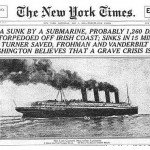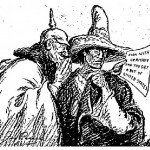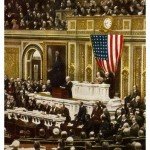
When the war erupted in August 1914, United States president Woodrow Wilson immediately asserted American neutrality and refused to expand military production or implement wartime economic measures. Most Americans supported Wilson’s determination to stay out of yet another European war, at least initially. But as historian Thomas Fleming correctly notes, while Wilson “talked and talked and talked” about neutrality, the actions of his government were neither “neutral in thought, word or deed”. For all the high-minded talk of neutrality and isolation, American sympathies were with Britain and the Allies, something best reflected in the reporting and editorial comment. The American press reprinted as gospel British propaganda about alleged German atrocities in Belgium; these stories horrified Americans and swayed public opinion against Germany.
Public attitudes toward the war were reflected in the business world. Many American capitalists ignored government bans on trading with belligerent nations, with several US companies leaping into armaments and equipment deals with the Allies. Charles Schwab, president of arms manufacturer Bethlehem Steel, sailed to Britain in late 1914 to sign contracts to build ten submarines and millions of artillery shells. New York banking firm JP Morgan organised loans worth $US2.1 billion to both London and Paris. These enormous investments in the Allied war effort gave the United States a stake in the war, even if the official position of its government was one of neutrality. But while America’s media and corporate moguls had backed their horse, the official position of the US government remained one of neutrality. Several factors and events between 1915 and 1917 undermined this position and fuelled calls for American involvement in the war.
The difficulty of Wilson’s position [of neutrality] began with recognition that the European war was not just another conflict, but one that would determine the future order of the world. The normal indifference of neutrals toward the outcome of wars… rested on the assumption of limited consequences… The fate of civilisation, of which America was a part, could not simply be viewed with indifference. The responsibility imposed upon America by a world in crisis was one that inescapably followed from her power and ideals. America could not be indifferent to the war and its consequences, content merely to observe it from afar and relieved not to be involved.
Robert W. Tucker, historian
German U-boat warfare. In November 1914 Britain’s Royal Navy laid down a strict maritime blockade of Germany. Its objective was to stop food and raw materials being imported into Germany via the North Sea. British naval vessels patrolled the area in numbers and laid minefields in sea lanes. All German shipping was deemed subject to attack, while neutral shipping – including vessels from the United States – were subject to boarding and cargo inspections. In February 1915 Germany responded to this blockade by declaring the seas around Britain and Ireland a “war zone”. Statements from the admiralty in Berlin warned that all Allied shipping in the area, military and civilian, might be sunk by German U-boats (submarines) without warning. Neutral shipping was warned to stay out of the area. Since the majority of neutral shipping in British waters was owned or licensed by American companies, many interpreted the German blockade and U-boat attacks as an act of war against the United States.

The sinking of the Lusitania. In May 1915 RMS Lusitania, a British passenger liner, was torpedoed and sunk by a German submarine off the coast of southern Ireland. Onboard were almost 2,000 people, of whom 1,198 were killed, including 128 Americans and almost a hundred children. The sinking of a civilian liner with an alarming death toll caused outrage on both sides of the Atlantic. Berlin claimed the Lusitania was being used to ship war cargo and munitions, a claim denied by her owners (though it was later revealed she had 4.2 million bullets, destined for the British army, stashed in her cargo hold). The sinking of the Lusitania heightened calls for American intervention in the war, calls that came from both sides of the Atlantic. Wilson publicly refused, declaring “there is such a thing as being too proud to fight”. But behind the scenes he was taking a much tougher tone in diplomatic cables to Berlin. In August that year the German navy sank another civilian ship, the SS Arabic, again heightening discussions. At the end of August Germany abandoned its policy of sinking civilian ships without warning – but in February 1917 Berlin replaced this policy with ‘unrestricted’ submarine warfare against all ships in Allied waters. Two more civilian ships on the US-Britain route, the SS Housatonic and the SS California, were sunk in the same month.

The Zimmerman telegram. The final thread that unravelled American neutrality was the public revelation of an explosive document. In January 1917 Germany’s ambassador in Washington received a coded telegram from Berlin, later discovered to have been approved by the German foreign minister Arthur Zimmerman. In the event of America entering the war alongside the Allies, the ambassador was to begin working towards an alliance between Germany and Mexico. The Mexicans were to be promised German aid to facilitate an invasion of several American states, including Texas, New Mexico and Arizona. The telegram was intercepted by British code-breakers, who passed it to Westminster, who passed it to the White House, which passed it to the press. So outrageous was its content that for weeks many considered it a forgery. But in March, Zimmerman confirmed its authenticity while delivering a speech in Germany. This news stirred American calls for war to a crescendo; not even the neutralist Wilson could remain unmoved.

In November 1916 Wilson ran for a second term in the presidency; one of his campaign slogans was ‘He kept us out of the war!’. In December, having narrowly won the election, he made a last-ditch attempt to negotiate peace between the Allies and the Central Powers. Both rejected his offer. The Zimmerman controversy in February 1917 thwarted his hope that America would avoid declaring war. In March 1917 Wilson asked Congress for funds to arm American civilian ships, to defend themselves from German submarines. A week later, on April 2nd, he fronted Congress and asked it to declare war on Germany, telling representatives that it must be “the war to end all wars”. The Congress approved Wilson’s request within two days. On the eve of his speech to Congress, Wilson confided in Frank Cobb, a New York journalist:
“Once we lead this people into war,” [Wilson] said, “they’ll forget there ever was such a thing as tolerance. To fight you must be brutal and ruthless, and the spirit of ruthless brutality will enter into the very fibre of our national life, infecting Congress, the courts, the policeman on the beat, the man in the street.”… He thought the Constitution would not survive it, that free speech and the right of assembly would go. He said a nation couldn’t put its strength into a war and keep its head level. It had never been done. The President didn’t have illusions about how he was going to come out of it, either. He’d rather have done anything else than head a military machine. All his instincts were against it. He foresaw too clearly the probable influence of a declaration of war on his own fortunes.”

1. The US adopted a neutral position when war erupted, though public sentiment leaned heavily toward the Allies.
2. Despite this neutrality, US companies supplied the Allied war effort with equipment and munitions.
3. US neutrality was challenged by Germany’s U-boat campaign against shipping, culminating in the Lusitania sinking.
4. The US was eventually drawn into the war by the Zimmerman telegram, a secret overture to Mexico from Germany.
5. US president Woodrow Wilson, who had long favoured neutrality and sought to broker peace deals between the Allies and Central Powers, urged Congress to declare war on Germany, which it did in April 1917.
© Alpha History 2014. Content on this page may not be republished or distributed without permission. For more information please refer to our Terms of Use.
This page was written by Jennifer Llewellyn, Jim Southey and Steve Thompson. To reference this page, use the following citation:
J. Llewellyn et al, “America enters the war” at Alpha History, https://alphahistory.com/worldwar1/america-enters-the-war/, 2014, accessed [date of last access].
